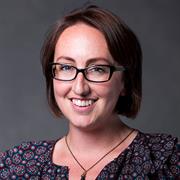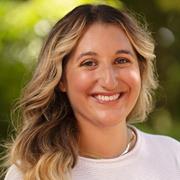Occupational Therapy: Post-professional Master's
Spring: Dec 15 (domestic only), Oct 15 (international)
Summer: n/a
Part-time (Daytime)
Part-time (Evenings)
Overview
The Post-Professional Master's in Occupational Therapy (PPM) is designed for registered occupational therapists with a bachelor's degree in OT. As a student in the program, you'll increase your knowledge of practice and evidence-based research and strengthen your skills in a specific area of practice.
This degree can be completed on a full- or part-time basis for working professionals with the option to start in either the fall or spring semester. Part-time students typically complete the program in 2 years (5 or 6 semesters), while attending courses during the evening, online and/or summer.
Program Outcomes
The Post-Professional Master's is available in two tracks: a Non-thesis/Practice Option and a Thesis/Research Option. In both options, you'll select a concentration in an area of practice such as childhood and adolescence, upper extremity rehabilitation, management, aging, education, mental health, and assistive technology. You may also choose a self-directed concentration focused on your individual interests. Working with your faculty advisor, you'll tailor your program and select courses in occupational therapy and in other departments relevant to your professional goals and interests.
Student who select the non-thesis/practice track will further develop their clinical reasoning and professional identity to become emerging leaders and advanced practitioners in occupational therapy. Students who choose the thesis/research option will plan, conduct, and disseminate independent faculty-mentored thesis research specific to an area of occupational therapy practice.
Application Requirements
- Application Fee
- Resume/CV
- Personal Statement: Please give your reasons for deciding to do graduate work in the field you have chosen. We are particularly concerned that you cover these points (3 pages double-spaced maximum):
- What previous experiences and commitments have brought you to consider applying for graduate training?
- What are your chief objectives in applying now?
- How do you think this Tufts program will help you in the pursuit of your objectives and vocation?
- Writing Sample: The Department of Occupational Therapy values the personal experiences and perspectives of our student body. Please reflect on and share how your life experiences would enrich your educational experience within the Tufts community. (2 pages max, double-spaced).
- GRE General Test scores are not required for applicants who have a degree from an accredited U.S. institution by time of enrollment. GRE scores are required for applicants who received a degree from an institution outside of the U.S.
- Official TOEFL, IELTS, or Duolingo English Test, if applicable
- Transcripts
- Foreign Transcripts: Applicants who did not receive an undergraduate or graduate degree in the United States must have their degree transcript translated into English, and it is strongly recommended that they also receive an evaluation by World Education Services (WES) or an equivalent service. Applications will not be reviewed if we do not have evaluated transcripts.
- Three Letters of Recommendation.
- Certificate of Hepatitis B Vaccination will be required upon enrollment.
Note: Applicants to the post-professional and certificate programs apply through Tufts' application.
International applicants interested in the post-professional master's program may apply as full-time students and start in the fall only.
Please contact Jill Rocca, Occupational Therapy Admissions Coordinator, if you have any questions about the application process.
Prerequisites
- One course in introductory statistics. The prerequisite course must be passed with a grade of B- or better and taken at an accredited college.
Tuition & Fees
GSAS bills tuition using a per-credit billing model, meaning you are billed for the number of credits you take each semester. This billing model is used to provide students better flexibility so they may "pay-as-they-go".
| Tuition* | $1,899 per credit |
| Total Credits Required | 30 |
| Enrollment Status | Part-Time: 3-6 credits (typically 1-2 courses) Full-Time: 9+ credits (typically 3 or more courses) |
Estimating Tuition Costs for this Program
This example pathway outlines estimated tuition costs per semester using a typical full-time course load. This is one possible pathway to completion; actual credits, costs, enrollment status, and degree completion time may vary based on a student’s course load.
| Full-Time Pathway | Fall | Spring | Total |
| Year 1 | 16 credits | 14 credits | 30 credits |
| $30,384 | $26,586 | $56,970 | |
| Estimated Total Tuition Before Aid* | $56,970* | ||
Note: this example does not account for any scholarships that may be awarded at the time of admission. GSAS offers generous merit- and need-based tuition scholarships for qualified applicants. A list of funding opportunities is provided below.
*Estimated based on 2025-2026 tuition rates. Rates are subject to change each academic year. For further information about the full cost of attendance, including health insurance, fees, and estimated indirect costs (housing, transportation, etc.), visit Student Financial Services.
Financial Aid & Funding Opportunities
At Tufts University, we believe that every qualified applicant should have the opportunity to pursue graduate study, regardless of financial circumstances. We are committed to helping you navigate the financial aspects of your education and strive to make graduate school accessible through a variety of support options.
Scholarships and Awards Available for this Program
- Merit- and need-based tuition scholarships for master’s programs: To be considered, be sure to indicate your interest within the Financial Aid section of your application.
- The Future Leaders Fellowship is a full-tuition scholarship for outstanding full-time master’s students and entry-level OTD students. Future Leaders Fellows are selected by the GSAS Dean following their admittance to Tufts.
- The Bekenstein Family Endowment Scholarship Award is given to occupational therapy students who have demonstrated a trajectory for leadership in the profession of occupational therapy, strong academic standing, and financial need.
- City Year Corps members, alumni, and staff are eligible to receive a minimum scholarship award of 25% off tuition.
Work Opportunities and Awards
- There are various graduate assistantships and work opportunities available for Master’s students across Tufts.
- The Graduate Student Open Access Publishing Fund provides financial support to students who want to publish their work open access.
- The Graduate Student Research Competition provides funding for expenses including equipment, materials, and supplies; research participant compensation; and expenses of travel to conduct research.
- The Graduate Student Conference Reimbursement Fund is available for students to travel to present or attend at a conference or professional meeting.
Visit our Graduate Financial Aid page for information on loans and financing options.
Career Outcomes
Average Age: 32
*Sources: GSAS-SOE Graduate Exit Survey 2020 - 2021 and Academic Analytics (Alumni Insights)
Faculty

Margaret Morris

Margaret Morris
Research/Areas of Interest: Board Certification in Pediatrics (BCP) 2012-2022, American Occupational Therapy Association Occupational therapy evaluation and intervention in pediatrics, particularly contextual and strengths-based services Pediatrics Evaluation, including strengths-based evaluation, occupation-based evaluation, context & environment Intervention, including models of occupation-based service provision, contextual services, collaboration, strengths-based, least restrictive environment Program development, including systems approaches, strengths-based, mindfulness, social-emotional regulation, physical literacy Teaching and Learning Models of professional development, andragogy, self-regulated learning Project-based learning, technology in teaching and learning, using visual analog scales in course evaluation, concept mapping Online teaching and learning, course design (F2F, hybrid, online)

Nancy Baker

Nancy Baker
Research/Areas of Interest: Chronic Pain, Virtual Reality, Musculoskeletal Health, Ergonomics Nancy Baker's research focuses on ways to mitigate musculoskeletal pain, so people with chronic pain can increase their participation in everyday life. She focuses on three pain mitigation pathways: 1) workstation ergonomics to address work environment properties that propagate pain; 2) improving care delivery in CTS; and 3) virtual reality (VR) as a therapeutic medium for pain. Baker's research is eclectic and uses a variety of tools and techniques to answer her research questions. A new area for her, her current research examines how to implement VR into clinical practice. Here pilot work has looked at what types and dosages of VR are most effective, how different diagnoses, such as chronic back pain or osteoarthritis, respond to VR, and she has partnered with rehabilitation centers to trial different implementation practices. So far, her research consistently demonstrates that VR has a significant effect on pain and that it can be feasibly done by practicing therapists. Some results found a carryover of effect past the immediate VR session. Baker is also working with colleagues to examine new paradigms in carpal tunnel treatment and is completing a trial looking at dosage for standing desk use.

Janet Brooks

Janet Brooks

Meredith Grinnell

Meredith Grinnell
Research/Areas of Interest: Current research interests include the use of tele-health technologies and patient participation in healthcare outcomes. Other interests include the use of social media to enhance engagement and communication within the profession as well as with patients.

Jessica Harney

Jessica Harney
Research/Areas of Interest: Rehabilitation Management, Evaluation and Treatment of physical dysfunctions, Evaluation and Treatment of Orthopedic Dysfunctions in the Athlete, Concussion Management and Education, Adaptive Sports as a Rehabilitation Tool Adaptive Sports, Concussion Management of the Athlete and Student, Professional development of the Health-Care Manager

Brynn Speroni

Brynn Speroni
Research/Areas of Interest: Brain Injury, Neurological Disorders, Substance-Use Community Programming, Occupational Therapy in Post-Secondary Education, Evaluation and Treatment of Physical & Cognitive Dysfunction, Rehabilitation in Inpatient Settings, Rehabilitation Management, Fieldwork

Ryan Whitney

Ryan Whitney
Research/Areas of Interest: Complex medical pediatric occupational therapy, fieldwork education, professional communication, professional development of emerging occupational therapists, interprofessional collaboration, community-based practice